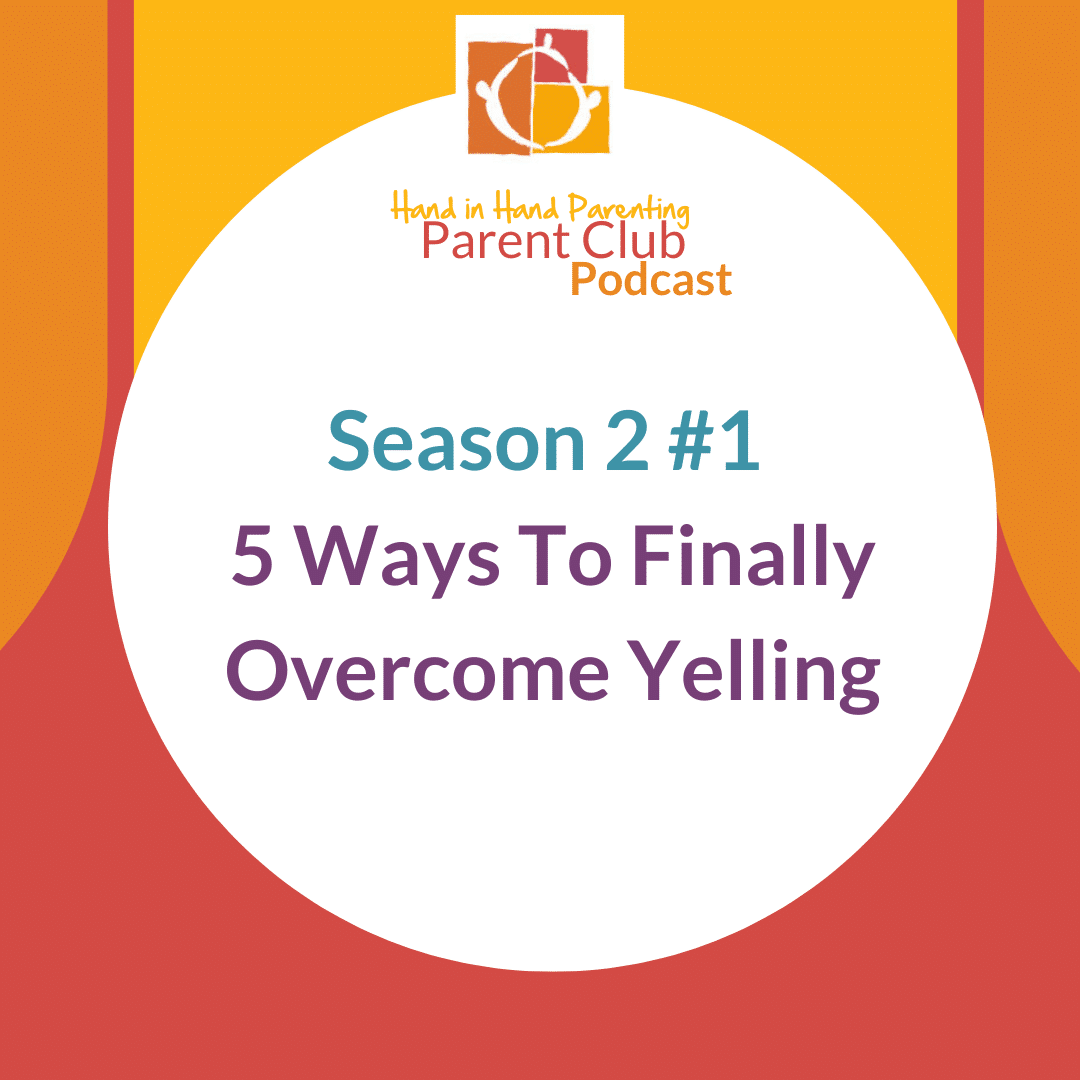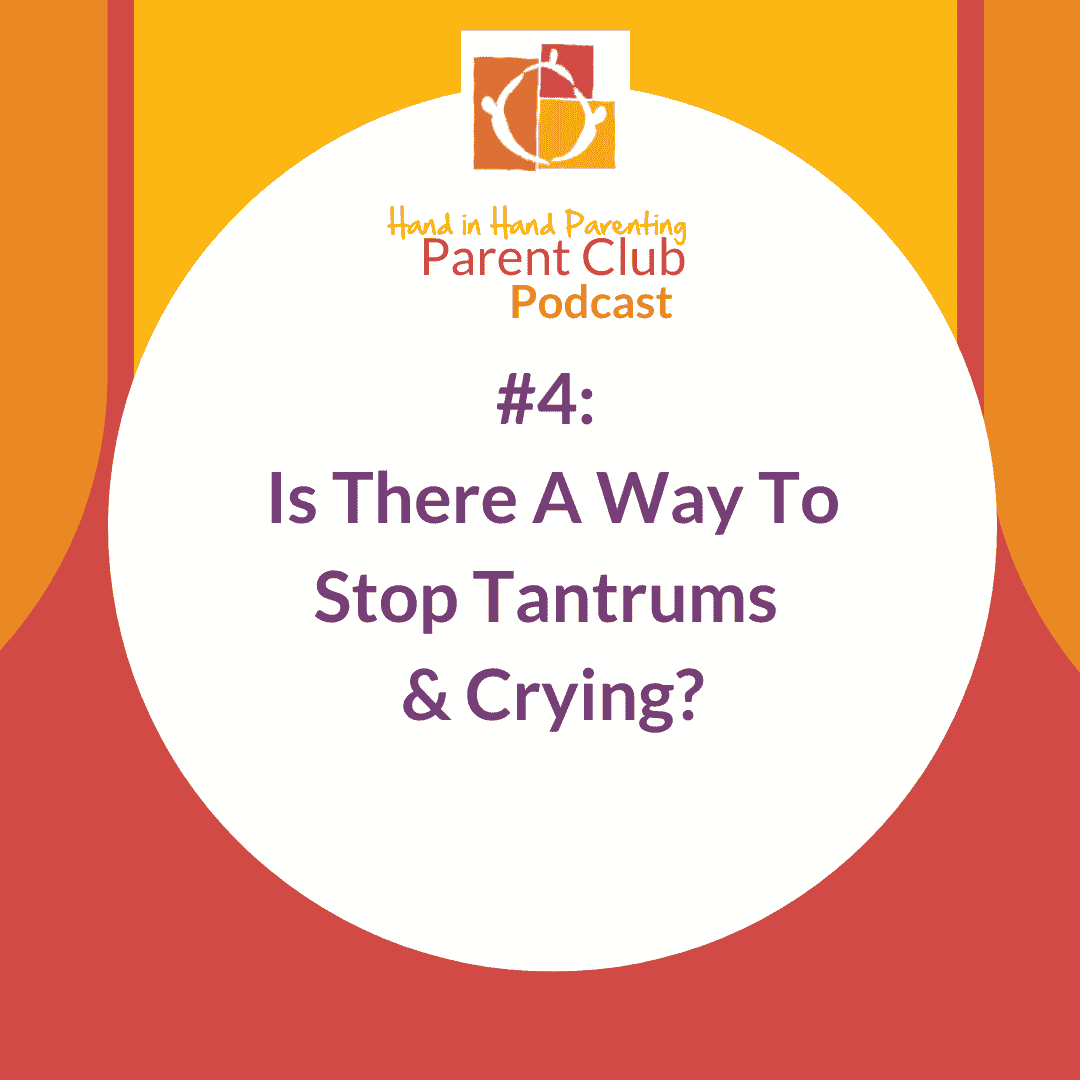Episode Transcript
Speaker 0 00:00:01 Welcome to the hand in hand parent club podcast. I'm Emily Murray, a hand in hand instructor and a mom of
Speaker 1 00:00:06 Two I'm Kathy Gordon, a single adoptive mom of a now young adult son, a hand in hand instructor. And we are both moderators of hand in hand's awesome membership program. The parent club,
Speaker 0 00:00:17 Every week, we'll be answering a parenting question. You'll hear about hand in hand. Parenting's powerful, respectful parenting tools. We'll share how they help you work with your child's feelings, especially when their behavior gets harder. Confusing.
Speaker 1 00:00:29 You can feel good about using these tools. They've brought warmth and connection to our own families and to many thousands of families around the world who are using the hand in hand approach.
Speaker 0 00:00:39 That's why hand in hand and the parent club exist. We're here to support you and your family. So you have more good, sweet fun times together
Speaker 1 00:00:49 This week. Our question is around stay listening when we're listening to our child's feelings, shouldn't I be doing something, what should I say when they're tantruming or crying?
Speaker 0 00:01:00 So today's podcast. We wanted to give you a kind of a big picture view of what's happening inside a human brain when we're having big feelings. And so when hand in hand, um, shares ideas from our approach, um, we're really talking to, and speaking to the parent child relationship or the, you know, adult child relationship, but these, these tools are pretty universal really. So this, this idea that hand in hand has that is rooted in great brain science, is that when a person is in an emotional state, um, when they're tight, when they're tense, when they're frustrated, when they're overwhelmed, they quite literally cannot access the thinking part of their brain. So when you see your child in kind of one of those hot spots or low spots, um, if you can imagine there's their thinking brain and their feeling brain. So they're really in their feeling brain at that moment in time when the feelings are coming off, when they're they're tantruming, when they're crying, when they're angry at you, if it's a hot feeling, they're in their feelings brain. So the interesting thing about our thinking brain is that that's where language, the ability to process language lives in that thinking brain, not in our feelings, brain
Speaker 1 00:02:31 And logic, language, and logic. Yeah.
Speaker 0 00:02:33 Reason, logic, patience, that even a sense of time really lives there. So that toddler who's like, I actually can't wait one minute, cause I'm gonna die. If I don't get that thing that I want, they're really feeling it. They're really feeling like I, I think I'm gonna die if I don't get this thing that I'm asking you for. And you're saying just one minute, honey, one minute. Um, so we are in our thinking brain. In that moment, we, we can see that big picture of, I just need to finish this one thing and then they can have my full attention and they're in their feelings brain where they have no concept of time and, um, are just suffering with their feelings. Um, so what we wanna give you in today's episode is a sense of your own thinking brain and feelings, um, system. So when you are, um, noticing that your child is upset, what we are suggesting is that you make sure you are in your thinking brain before you go to them as often as possible <laugh> and things tend to go better when we can respond from our thinking brain versus reacting from our own place of feelings to whatever it is that they're bringing up.
Speaker 0 00:03:50 So this idea of responding from the thinking brain versus reacting from the emotional system.
Speaker 1 00:03:58 And, you know, what's what I love about this tool stay listening is that the name says what it is we stay and we listen, but it can be really difficult to give what we didn't get when we weren't listened to as a child, you know, and maybe it wasn't modeled for us. We were told to suck it up or go to your room or, you know, go to your room until you can behave. Um, and, uh, so when we didn't get, when nobody listened to us, we might take our kids behavior personally. And oh, one thing we wanna mention is that Emily just talked about how, you know, they don't really have access to logic and language. There may be words coming out of their mouth. Um, and we might think that they can think because there are words coming out of their mouth, but it's, it's really, they really don't have access to logic, even though there are words coming out of their mouth.
Speaker 1 00:04:58 And so that's why, you know, when your kid is screaming, I hate you. You're the worst mom ever again, nobody listened to us and that might, you know, trigger some feelings of our own childhood hurt. So it's, it's tough in that moment to stay and listen. And, um, so you know what? We have some ideas for you. Um, of course we have our hand in hand parenting tool, parent to parent support tool called listening time, where we go and we get listening time. Um, so that we get the experience of somebody listening to us. But we also have some ideas for you in the moment that can help, um, that, you know, in that moment we can, um, you can take a breath and you can look at them and think like, oh, this is like an emotional puke. What would I be doing if my child were peeing or pooping or, um, puking, you know, I would not take that personally.
Speaker 1 00:05:59 And for me as an adoptive mom, you know, most adoptive parents will tell you that at some point your child is going to yell at you. You are not my mom. And that happened with my son sort of, um, preteen somewhere around 10, 11, he would get angry with me. And he would say that, and I had to get a lot of listening times so that I didn't take it personally so that I could look underneath the words that were coming from that again, even though he's, he is there words are coming out of his mouth, he doesn't have access to logic. It's all coming from that feeling place. So if I could look underneath those words to see the hurt that, that he was expressing, then I wouldn't take his, his behavior personally. Um, uh, you know, I could, I could stay and I could listen to the hurt rather than, you know, getting into, uh, getting, uh, upset and going into that feeling place myself. I could stay in my thinking place where I could, um, I could stay and I could listen to hemp.
Speaker 0 00:07:09 Yeah. It's like sometimes in those moments, um, staying in our thinking brain means that we are listening to what's underneath the words. If we find ourselves being drawn into, um, reacting to the words that they're saying, trying to explain, or trying to justify or reason, then we know, oh, shoot, I've, I've slipped into this, the emotional soup swamp with you here. Um, so what, what do we say? What can we say in that moment that really supports their, um, natural, innate healing process, which is shedding tears having a tantrum, a nice kind of sweaty release. Um, sometimes it's big laughter, but you know, we're, we're kind of focused on the, um, tearful side or the, the upset side, um, in this episode, um, we really wanna kind of keep them in that space of that good work that they're doing. So what we first try to do is just not do things that engage the thinking brain. Like let's not pull them out of it with something that's distracting, like a question like, oh, are you angry about, are you actually angry that I was late to pick you up today? We're we're not going there just yet with stay listening first. We want them to clear out that good stuff. So step one is just, don't engage the thinking brain, stay with them in that emotional place where it is just feelings. And you can do that by just kind of murmuring empathetic, validating things. Oh, I hear you. I'm sorry. That's so hard.
Speaker 1 00:08:50 Yeah, right here.
Speaker 0 00:08:52 Yep.
Speaker 1 00:08:53 We're gonna get that.
Speaker 0 00:08:56 Yeah. That sense of, um, they have someone with them during this scary, emotional, um, experience that they're having. Uh, and that's tricky because we're socialized to fix it, distract it, crying is bad. Um, and this is really a completely different way of thinking. It's a big paradigm shift to see the expression of emotions as a normal, healthy, useful process. Um, so dipping into that, I'm just gonna let this flow, I'm just gonna listen. Um, I'm just gonna murmur these kind things. You really wanted that Popsicle. I know. Oh, I'm sorry. That broke. You really loved that rather than saying actually there's another toy right here. That's identical. Like we're not gonna get into that just yet. So an example of this recently is, um, my daughter attends, uh, you know, one of those gym classes where they jump all around the gym for a while, and it was an open gym time and she was with her friend and she thought she was gonna be able to play with her friend the whole time.
Speaker 0 00:10:02 And her friend had other ideas. She really wanted to work on a specific thing. And, um, so my daughter kept trying to play and set up these play spaces and then she'd look around and her friend was gone working on the thing that she wanted to work on. And so, you know, throughout the time we were, you know, as parents, we were trying to help them figure it out and, um, help them communicate well with each other about what they were doing. Um, but my daughter just collected these upset feelings about her friend ditching her. And so on the ride home from the gym, my daughter could not let this go. It really had stuck into her system that she had been ditched and abandoned. And I made the mistake of, for the first half of the drive, continuing to try to explain that her friend just wanted to try to practice her own thing.
Speaker 0 00:10:54 And let's just understand that sometimes people have different blah, blah, blah, blah, blah. I mean, literally I'm sure she was hearing my voice as like the Charlie brown, blah, blah, blah, voice. Um, so finally the last leg of the trip, I'm like, Ugh, just listen, just stop talking and just listen. So I said to her, did you just need me to be on your side for a little while? Oh, the relief in her body. I saw it in the rear view mirror. She was like, yes. So I playfully was like that jerk. I can't believe she did that to you. And we got into this like really almost playful, um, me hamming it up, being overly protective and overly angry on her behalf. Oh, she drank it in and tears were rolling down her face while she was kind of laughing and crying, but I really just needed to stop talking, hear what she needed from me, for her feelings system to get over that sense of, of being abandoned, um, in that moment.
Speaker 1 00:12:06 Yeah. That's awesome. And one thing I forgot to mention about if they, if part of their emotional release or emotional puke is, you know, saying things like I hate you or, um, you're not my mom, uh, I forgot to mention that what I uh, would do with that was I would translate and I would hear like, you're not, my mom is like, I'm really hurting or you're the worst mom ever. Um, I hate you means like I hate these feelings. And so coming up with little phrases like that, where you're translating what they are saying in your own mind, or, you know, um, if I would, if I would start to get tight by something that I was hearing, um, I would put my hand on my chest and I would say soft, or I would say to myself, something like, um, he does not wanna be like this.
Speaker 1 00:13:04 This must be so painful for him. Like those mantras would help me, um, you know, be able to beam that message of him that strong nonverbal message of I'm not worried because we've talked about how releasing these, you know, when our kids have tantrums and tears, that's their natural healing process. We have that same natural healing process. When we do that enlisting time or with a friend where we get to have our own Tant, we get to have a good, hard cry. So when we are listening to our child and they're having that good, hard cry, one of the things that really creates that helps that natural healing process is when we are beaming that strong message to them of that nonverbal message. I'm not worried. So the one small thing we'd like you to try this week is to come up with some mantras for yourself. Think about translating when they say those words that, um, get you, that you might start to take personally, or even if they say something that you think like Emily said, like you wanna, um, explain the other person's point of view where you wanna teach. Like, because there's no access to logic and language. This is not a teachable moment. So come up with a mantra or two of like, oh, that you just say to yourself, like
Speaker 0 00:14:28 Mine was always like this isn't an emergency. Like I could feel my body soften when I would say to internally, this isn't an emergency or what is this really about?
Speaker 1 00:14:39 Yeah. Or there's nothing to fix here, or I'm not worried. And as I said, you know, sometimes just putting my hand on my chest and just saying to myself in my mind, soft would allow me to see my son's upset and, and listen to him rather than getting involved in my own hurt feelings or my own feelings of urgency or having to fix it. So we would love to hear from you. We'd love to hear what mantras do you come up with? What little thoughts do you have in your mind that are gonna allow you to simply stay and listen? So thanks for tuning in, and we look forward to connecting with you next week. Byebye,
Speaker 0 00:15:24 Thank you so much for tuning into the hand in hand parent club podcast, please like, and subscribe to hear more and to connect with us between these episodes. Come on over to hand in hand parenting.org to join the parent club where you can get coaching classes and live support.
Speaker 1 00:15:37 Come join our vibrant community of parents in the parent club who are committed to getting the support. They need to be the parents they wanna become. We'd be honored to support you too. This podcast and the parent club are part of hand in hand parenting, a nonprofit organization that supports parents all over the world. We are here for you when parenting gets hard.


